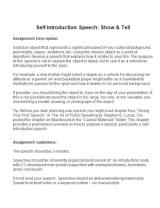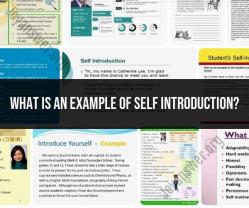How do you write an introductory speech about yourself?
Writing an introductory speech about yourself can be a great way to introduce yourself in a professional or personal setting. Here's a step-by-step guide to help you craft an engaging and effective introductory speech:
Step 1: Start with a Greeting
Begin your speech with a warm greeting to the audience. This sets a positive tone and establishes a connection with your listeners.
Example: "Good morning/afternoon/evening, everyone!"
Step 2: Introduce Yourself
Clearly state your name and any relevant background information. Keep this part concise and focus on key details that are relevant to the occasion.
Example: "My name is [Your Name], and I am [mention a brief description, e.g., a student, professional, or your role in the organization]."
Step 3: Provide a Brief Personal Background
Share some pertinent details about your background, such as where you're from, your education, or any notable experiences that have shaped you. Be selective and highlight aspects that are relevant to the context.
Example: "I was born and raised in [City/Region], and I recently graduated from [University/College] with a degree in [Your Field]."
Step 4: Highlight Achievements or Accomplishments
Mention a few key achievements or experiences that showcase your skills and qualifications. This helps establish your credibility and provides the audience with a sense of your capabilities.
Example: "During my time at [University/Company], I had the opportunity to [mention a specific achievement or project], which allowed me to develop strong [mention relevant skills]."
Step 5: Express Your Passion or Motivation
Share your enthusiasm or motivation for being in the current situation or for pursuing your goals. This adds a personal touch to your introduction and helps the audience connect with your aspirations.
Example: "I am truly passionate about [mention your passion or area of interest], and I am excited to [mention your goals or what you hope to contribute]."
Step 6: Conclude with a Transition
Wrap up your introductory speech by smoothly transitioning to the next part of the event or conversation. This could involve expressing your eagerness to learn more about others, participate in the upcoming activities, or engage in further discussions.
Example: "I look forward to [mention what comes next, e.g., working with all of you, hearing your stories, etc.]. Thank you for allowing me the opportunity to introduce myself."
Additional Tips:
- Keep it Concise: Aim for a speech that is brief and to the point. Avoid providing excessive details that may overwhelm the audience.
- Practice: Rehearse your speech to ensure a confident and natural delivery. Practice in front of a mirror or with a friend to get feedback.
- Adapt to the Audience: Tailor your speech to the specific context and audience. Consider the tone and formality appropriate for the occasion.
Remember, the goal is to create a positive and memorable impression, so be genuine, confident, and engaging as you introduce yourself.
What are effective strategies or key points to include in an introductory speech about oneself?
Here are some effective strategies and key points to include in an introductory speech about yourself:
Capture attention and make a strong opening:
- Start with a personal anecdote, quote, or question: Grab your audience's attention from the beginning and make them curious about you.
- Use humor or a surprising fact: Inject some personality and make yourself memorable.
- Connect to the audience: Find a common ground or shared experience to establish a rapport.
Highlight your key qualities and experiences:
- Focus on 2-3 key traits or skills that define you: Don't try to cram everything in. Choose the most relevant and impactful aspects of yourself.
- Use storytelling to illustrate your points: Share concrete examples of how you've demonstrated your skills or qualities in past experiences.
- Quantify your achievements if possible: Use numbers and data to showcase your impact and success.
Show your passion and purpose:
- Share your motivations and aspirations: Let your audience know what drives you and what you're passionate about.
- Connect your personal story to the context: Explain how your experiences and skills relate to the event or setting.
- End with a call to action or a thought-provoking question: Leave your audience with something to ponder and encourage them to engage with you.
Additional tips:
- Keep it concise and focused: Aim for 2-3 minutes to hold your audience's attention.
- Speak naturally and confidently: Avoid monotone delivery and use pauses effectively.
- Practice your speech beforehand: Rehearse to ensure fluency and avoid rambling.
- Be yourself and let your personality shine through: Authenticity is key to connecting with your audience.
By following these strategies and incorporating these key points, you can create an engaging and memorable introductory speech that leaves a positive impression on your audience. Remember, the goal is to share your unique story and let them know who you are and what makes you tick.
Good luck with your speech!





